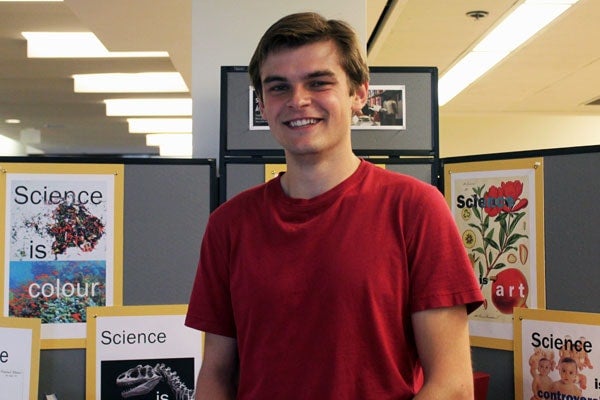
Science Literacy Week at U of T: from the night sky to Jurassic Park
Published: October 8, 2014
When Jesse Hildebrand witnessed a seventh-grader visiting the Thomas Fisher Rare Books Library to tour some of the most important scientific books ever produced, he knew he was on to something special with Science Literacy Week.
It was a familiar scene to Hildebrand. When he was little, all he had to do was express the slightest interest in a topic and his parents would take him to the library to find out more.
Their efforts spawned not only a lifelong love of science, but of communicating it – leading alumnus Hildebrand to help create Science Literacy Week.
“U of T is in a perfect position to demonstrate the importance of science,” said Hildebrand. ”It houses some of the best science faculty, research facilities and students in the world and occupies a central position in the largest city in Canada.”
From September 22-28, the inaugural Science Literacy Week took place at U of T, with a focus on the theme ‘Wonder and Scepticism.’ Spearheaded by Hildebrand and U of T Libraries, in collaboration with the Toronto Public Library and York University, the city-wide event offered public access to documentary screenings, book displays, lectures and more, showcasing all things science – from palaeontology to astronomy.
“Supporting science engagement publicly, especially for as prominent an institution as U of T, makes people recognize just how important and fascinating science is,” said Hildebrand.
Lectures at the Gerstein Library – featuring fun topics such as ‘Fact and Fiction in Jurassic Park’ and the misconceptions of the Big Bang Theory – were particularly popular. Also a big hit were the science demonstrations, including an opportunity for the public to observe the night sky and beyond at the McLennan Physics Building.
Science Literacy Week has been a passion project for Hildebrand, who started working on the event right after his very last class at U of T. He believes science literacy is more important than it has ever been.
“Science forms the backbone of a great deal of our everyday experience,” said Hildebrand. “I think just as literacy enables you to understand the language that forms the basis of our society, science literacy empowers people to think sceptically about scientific claims, and to appreciate the nature of scientific inquiry and discovery.”
Those sentiments are echoed by world-renowned regenerative medicine expert, Molly Shoichet, recently appointed as the senior advisor on science and engineering engagement at U of T. (Read more about the appointment.)
“So many decisions and policies are made without sufficient scientific process and basis. Science literacy is the basis of our lives and critical to making the best decisions that will influence our lives now and in the future,” said Shoichet. “It is fantastic to have people like Jesse collaborate with our librarians across U of T and the city of Toronto to highlight the curiosity that is the basis of all scientific research.”
With the early success of Science Literacy Week, Hildebrand, who studied ecology and evolutionary biology at U of T, hopes to turn the event into a Canada-wide initiative to spread the message of science literacy and engagement.
“I'd like to expand it a great deal, both in spreading the central idea and activities behind this year's event across the country and in expanding the roster and size of events here in Toronto,” he said. “As for talking to potential participants for next year and in trying to make more events happen here – well, that's already begun.”
Liz Do writes about education for U of T News.



